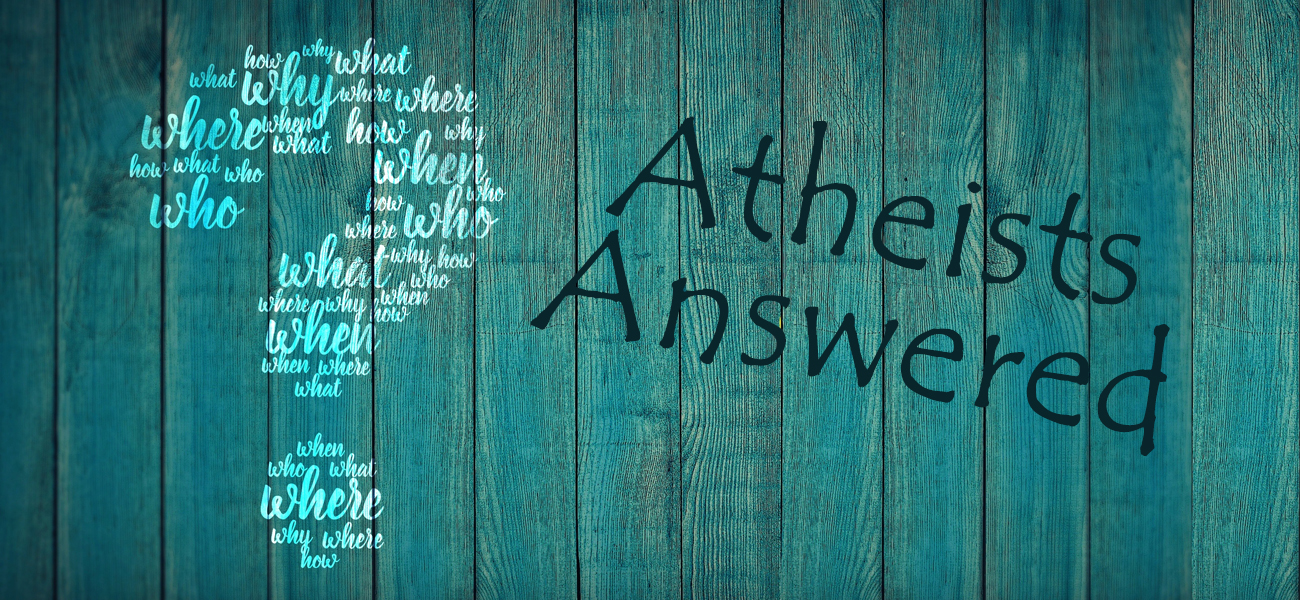Atheist's Attacks
Answering Humanist's Accusations Against the Bible


Is Science Superior?
Does following science instead of religion give superior results?
THE HUMANIST'S CLAIM IS That: Science Bests Supernaturalism
White states that despite all the prayers, rituals, and other religious activities performed throughout the centuries, the frequency and severity of plagues did not diminish until scientific hygiene made its appearance. In regard to the hygienic improvements instituted during the second half of the nineteenth century, White explains: “The sanitary authorities have in half a century done far more to reduce the rate of disease and death than has been done in fifteen hundred years by all the fetiches which theological reasoning could devise or ecclesiastical power enforce.”
The superior results of using science instead of religion can be seen in many other fields. Humanists therefore accept the scientific view that this world operates under unvarying natural laws that cannot be suspended by religious rituals or other means.
If you haven't already done so, please read the page about Andrew White. He is not a trustworthy authority.
The question is; does following science instead of religion give superior results? The answer is... it can, if the science does not vio-late Biblical teaching such as good sanitation, hygiene and quaran-tine practices. “Religious” practices are not always Biblical. In many cases religious practices were created by people to satisfy human de-sires, in other words to make people feel good about themselves. What people do or practice, does not define what the Bible teaches. The humanists continually confuse religion and the Bible. Religion, created by people, does not define what the Bible teaches.
Does This Mean the Bible Opposes Science?
No, it does not. Science and the Bible are in perfect harmony. Humanists (mainly Draper and White in the 19th century) created the idea that science and the Bible are at war in an effort to discredit the Bible and promote atheism. As we look at the facts, we will see that atheism (humanism) has thoroughly discredited itself in its ef-forts to paint Christianity as the enemy of science.
History of the Warfare of Science with Theology in Chris-tendom
When someone quotes extensively from a book, I like to read that book. In this case, the book is “History of The Warfare of Science With Theology in Christendom.” It is a difficult book to read because, while it claims to be scientific, it largely consists of fiction and false claims, to the extent that it is sickening at times. White’s basis for writing this book is a presupposition that science and religion are in conflict, and one (science) must and will triumph over the other (re-ligion). By “religion” or “theology” he is referring to Christianity. No other religion is discussed in his book.
"More and more I saw that it was the conflict between two epochs in the evolution of human thought--the theological and the scientific." -- Andrew D. White, "History Of The Warfare of Science With Theology in Christendom," from the Introduction.
The theory that science and Christianity are in conflict is false. People who deny the creator God of the Bible desire this conflict to exist, but it does not. The problem is that in order to deny God, the physical evidence, such as the supernatural, must be denied . That leaves no other option other than distorting the truth about Christianity.
I would love to say that both science and Christianity have truth as an objective. However, that would be a false statement. If it were, science and Christianity would be in perfect harmony. However, if you turn away from God and the truth of scripture, you invariably must turn science away from seeking the truth.
What's Wrong With This Humanist Claim?
Based on what we have already discussed you should easily see what is wrong with this humanist accusation. What is it?
Throughout the centuries, other than the Jews, people did not follow the principles for sanitation, hygiene, and health laid out in the Mosaic Law in the Bible.
What did science "discover" that made a major improvement in fighting disease? Plague had been sweeping across Europe, peaking in the mid-14th century. What stopped the plague was the "discovery" of quarantine.
"The practice of quarantine, as we know it, began during the 14th century in an effort to protect coastal cities from plague epidemics. Ships arriving in Venice from infected ports were required to sit at anchor for 40 days before landing. This practice, called quarantine, was derived from the Italian words quaranta giorni which mean 40 days." - Centers for Disease Control and Prevention
Andrew White, as referenced by the humanist author, claims that the introduction of scientific hygiene ended the plagues. Let us get some facts on the history of hygiene from the Hygiene For Health web site:
"1800s: England’s population increased rapidly but its number of toilets did not. Most human waste made its way into cesspools, dung-heaps, cellars or the street. Waste and garbage made its way into rivers, polluting the water and giving rise to foul odours. In 1842 public health reformer Sir Edwin Chadwick published his Sanitary Health Report. As a result the 1848 Public Health Act was instituted, followed by the 1866 Sanitary Act, making local authorities responsible for sanitary regulation including sewage disposal, water supply and housing density & occupancy, and introducing penalties for persons suffering from dangerous infectious diseases who endangered others in public places."
When were good hygiene practices first introduced and mandated by law? We’ll need to go back about 3,100 years before the 18th century. Back to the days of Moses, when God’s hygiene laws were first recorded.
“Long before the existence of medical science and the field of micro-biology, there existed rules in the Old Testament for good community hygiene, and also a meticulous protocol that was mandated to prevent the spread of contagious diseases.” – Larry Ball, Quarantine Laws and the Bible.
White specifically refers to improvements made by “sanitary au-thorities.” However, millennia before that, what did the Bible pro-scribe concerning the disposal of human waste?
Designate a place outside the camp where you can go to relieve yourself. As part of your equipment have something to dig with, and when you relieve yourself dig a hole and cover up your excrement.– Deuteronomy 23:12-13
What is the principle taught here? Keep human waste separate from humans. Dispose of it away from where you live, and in a way such as to prevent people from coming into contact with human waste. Those are foundational sanitation principles.
What about after someone becomes sick or has an infection? What should be done?
"It is important to note that even when there was reasonable suspicion that a person had an infectious disease, there was a definite amount of days of quarantine required during the detection period (Lev. 13: 26, 33). If the infection was eventually identified as a communicable disease then his personal effects were to be destroyed with fire (Lev.13:55), and even his house was to be torn down and taken outside the camp (Lev. 14:45). If the infection was not contagious, then there was a rather elaborate ritual in order to give thanks to God.” ” – Larry Ball, Quarantine Laws and the Bible.
For 3,100 years, the Bible required what science did not figure out until the 19th century. Regular hand washing, bathing, food safe-ty, quarantine was all part of God’s instructions for healthy living in 1300 B.C. However, people ignored God’s instructions and followed human wisdom, the “science” of their day, and they got sick and died.
Yes, the institution of scientific hygiene was an incredible benefit to humankind. That we now have modern medicine and we un-derstand how to prevent and cure many diseases is a true blessing and not to be belittled. However, do not belittle the Bible and Chris-tianity either. God gave us the answers thousands of years ago… and people chose not to believe Him. Here is one final example from scripture, this time an example of quarantine:
But if the bright spot is white on the skin of his body, and it does not appear to be deeper than the skin, and the hair on it has not turned white, then the priest shall isolate him who has the infection for seven days. - Leviticus 13:4
Conclusion: : The humanist claims concerning science being superior to the Bible are without merit. The claim that people died from the plague because they turned to religion (Christianity) is false. People died because they ignored what the Bible teaches.
The next humanist claim: And Humanists esteem highly those who study this world and provide a better understanding of it. Unlike the theologians who focus on influencing supposed supernatural powers, persons using a scientific outlook have enabled great progress to be made in reducing misery and increasing happiness.
We've also talked about this one previously. But since they brought it up again, we'll go over it again. Click here.
30 SECOND VIDEOS

GOD & BIBLE:
Why Doesn't God End Evil?
Do Miracles Mean The Bible Is A Fairy Tale?
Was Jesus' Resurrection Real or Fake?
Do Babies Go To Heaven?
Can We Know God Exists?
_________________
AGE OF EARTH:
Carbon Dating Says The Earth is Young
The Failure of Radio Isotope Dating
The Age of the Earth - Helium In Rocks
Dinosaur Soft Tissue Shows Dating Methods Don't Work
Does DNA Show Eve Was Created 6,000 Years Ago?
